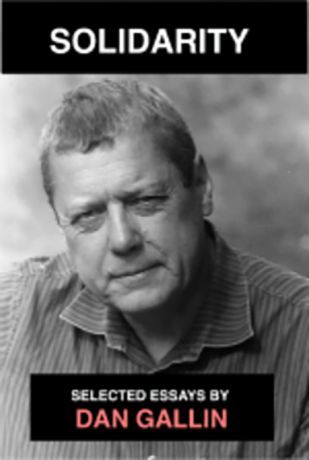Arts
You are here
50 years of labour solidarity

September 15, 2014
This fourth book from Labourstart, the online solidarity campaigner, presents a bold challenge to the labour movement to return to its social and political roots. The author is eminently qualified to issue the challenge, having worked for over 50 years in the field of international labour solidarity, much of that time as General Secretary of the Geneva-based International Union of Food and Allied Workers (IUF). This timely book raises a lot of questions essential to the survival of the labour movement.
Dan Gallin was born in Romania in 1931. His father was a diplomat stationed in Berlin, who was forced to take refuge in Switzerland with his family during World War II. In 1959 Dan received a scholarship to the University of Kansas, where he joined the youth wing of the International Socialist League, and came under the influence of Julie Jacobson and Hal Draper. He was politically active both on and off campus, to a point where he stopped studying and failed his exams. This being at the height of the McCarthy era, he was eventually arrested, and advised to leave the country or be deported. Back in Switzerland he resumed his studies and received his M.A. in 1958, all the while continuing to be politically involved from a Trotskyist perspective. In 1960 he became Assistant General Secretary of the IUF, and was full General Secretary from 1970 to 1997.
The 19 chapters of this book consist of selected articles and talks by the author, over the period 1958 to 2013. The first two articles are somewhat autobiographical, and are followed by essays on the French Left, the Algerian revolution, and the European revolutionary writer Victor Serge. The remaining articles are from 1994 onwards, and reflect Gallin’s 30-plus years experience at the heart of international labour solidarity. Of particular interest is his account of the various International Framework Agreements which the IUF and other trade secretariats entered into with multinationals such as Danone, Nestle, British-American Tobacco and Philips.
An effective IUF initiative in the early 1980s was the worldwide solidarity campaign on behalf of their Guatemalan affiliate at the Coca-Cola bottling plant there. By means of demonstrations, solidarity messages and negative publicity, Coca-Coca International was persuaded to have the owners of their Guatemalan franchise recognize the union and cease violence against its members.
In talks to various labour gatherings over the years, Gallin reveals his take on politics and trade unionism. He denounces the Stalinist regimes in Russian and China as a parody of true socialism, which is above all democratic from the grass-roots up. In the early years trade unions were comprehensive in their activities on behalf of workers, encompassing not just wage negotiations, but also credit unions, human rights, education and everything that affected the welfare of workers and their families. They had their political parties and even their militias for self-defense. Nowadays unions are reduced to the core activity of contract negotiations with employers, leaving the rest of their earlier functions to NGOs. He calls these latter “the illegitimate children” of the trade union movement, which must be recognized and reclaimed.
Gallin describes how the two World Wars, Stalinism and the Cold War largely caused the trade union movement to lose its original vision and strength. His vision involves broadening the definition of the working class, and organizing the informal sector, hitherto considered outside the scope of traditional unionism. He emphasizes that unions must be controlled by their members, not by any political party. Citing Marx, he calls upon socialists to break with all forms of sectarianism. The chapter critiquing the views of Service Employees’ International Union (SEIU) president Andy Stern on China is noteworthy, as is his speech last year at a SYRIZA event in Greece. Gallin is currently chair of the Global Labour Institute in Geneva, and is researching union organizations of women in the informal economy, labour movement history, and issues of policy and organization in the international trade union movement.
For more information visit labourstart.org
Section:
Topics:









